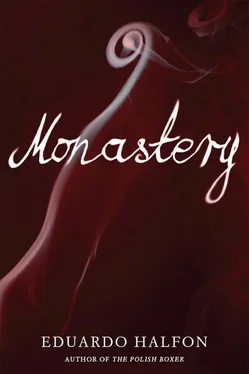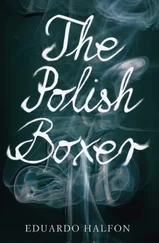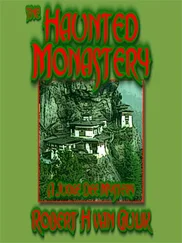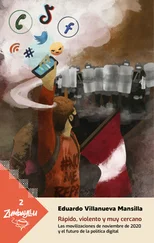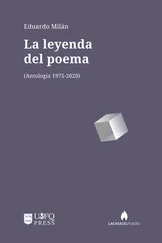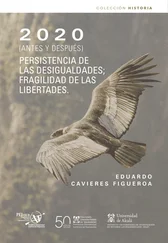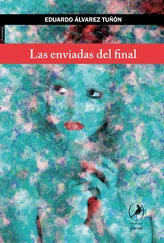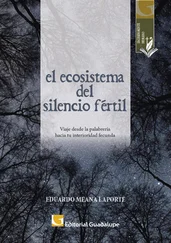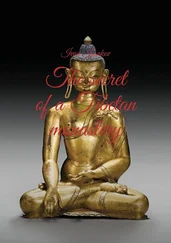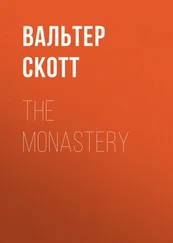Don Juan stood and we continued walking in silence among the coffee plants, traversing the slippery, uneven terrain. We heard the distant cry of a falcon, then the sweet metallic trill of a motmot, then the joyous cackling of a flock of parakeets.
We came upon some dilapidated, rotting wood huts. What’s this, Don Juan? I asked, but Don Juan made no reply. Perhaps he didn’t hear me. He stood before a lone coffee plant, tall and dense and bursting with red fruit. All of that, said Iliana, jerking her jaw toward the row of huts, was my brother’s chicken coop. No one has kept it up for the past three years. Ever since he was murdered.
Don Juan turned his back to us and seemed to step into the enormous, lone coffee plant. As though hiding among its green leaves, searching for something among its green leaves. As though wishing the old plant would protect him. His back still to us, he was plucking beans off the old plant, slowly, tenderly, his campesino hands letting the red fruit fall soundlessly onto the dry ground. He bent a little and picked the lower beans. He stretched to the upper branches, pulled them toward him, and his expert hands stripped them clean. The ground around his feet was turning red. His straw hat crackled in the branches. He now looked more hunched, smaller. He kept on plucking beans and dropping them onto the ground. He kept entering the foliage of the old plant, the greenery of the leaves and branches, until the whole of him disappeared entirely.
The young officer was readingthe pages of my passport diligently, scrupulously, as though they were the pages of a gossip magazine or a cheap novel. He held them up. He looked at them against the light. He scratched them hard with the nail of his index finger. It occurred to me that he might fold over the corner of one of the pages at any moment, bookmarking it, as though planning to return to his reading later. You travel a lot, he said suddenly, as he looked over all the stamps. I didn’t know whether this was a question or an observation and so I remained silent, watching him sitting there in front of me, on the other side of a black metal desk. He couldn’t have been twenty. His face was beardless, dark brown, gleaming. His green khaki uniform fit him too tightly. He seemed unbothered by the beads of sweat that ran slowly down his forehead and neck. So you like traveling, he mused without looking at me, in the contemptuous tone of a new soldier. I considered telling him that all our journeys are really one single journey, with multiple stops and layovers. That every journey, any journey, is not linear, and is not circular, and it never ends. That every journey is meaningless. But I didn’t say anything. Through the open door I could make out the noise of motorcycles, trucks, vans, a ranchera being sung on a transistor radio, thunder in the distance, swarms of flies and mosquitoes and men shouting offers to buy and sell Belizean dollars. Revolving in the corner, an old floor fan simply circulated the humid afternoon jungle heat.
It was my first time there, in Melchor de Mencos, the last Guatemalan town before crossing into Belize. I had left the capital early in the morning, and driven to the border stopping only once, at the halfway point, at Lake Izabal, to put in some gasoline and have some lunch — a seafood broth, a handful of dark tortillas with queso fresco and loroco flowers, and plenty of coffee.
Señor, your place of residence? the officer asked me all of a sudden, still looking through the pages of my passport and jotting down my details in a huge accounting ledger. Guatemala City, I lied, although it wasn’t altogether a lie. And the reason for your trip to Belize? I’m going to visit some friends, in Belmopán, I lied, although that wasn’t altogether a lie either: I had been invited to give a reading at the University of Belize, in Belmopán; traveling by land had been my idea, to get to see the road, to get to know Belize’s beautiful white-sand beaches, Belize’s idyllic turquoise blue sea — an idea that now, having seen the distance and the terrible state of the highways, I was starting to question. And your profession, señor? Engineer, I lied, as I always lie, as I always write on immigration forms. It’s much more advisable and prudent, especially at a border of any kind, to be an engineer than a writer.
The officer said nothing, and slowly, with all the lethargy of the tropics, he continued to note down my details.
Outside, it was cloudy and thick and the sky looked ready to burst. After wiping my forehead with my hand, I started looking at a huge map of Guatemala that was stuck on the wall just behind the officer, and I remembered how, as a boy, in the seventies, I had won a prize at school for having drawn the best map of the country. My drawing, of course, still included the then province of Belize, the largest one, located in the far north. It wasn’t until 1981 that Belize gained its independence — and until 1992 that it was recognized by Guatemala — thereby ceasing to be the upper part of the map that I’d learned to draw as a boy. I was never very good at drawing. But that one time, I remember, I really made an effort. And my prize, which I took with some astonishment from the hand of my teacher, was a small green mango. I still can’t see a map of the country without thinking of a green mango. I still can’t see a map of the country without thinking that Guatemala, in a more than figurative sense, had been decapitated.
NO GOOD, SEÑOR.
It took me a moment to understand that the officer, without looking up and barely audible over the wheezing of the fan, was talking to me.
What did you say? I asked. I said this is no good, he said, closing my passport and dropping it onto the metal desk as if in disgust, as if it were something stiff and rotten. Your passport, señor, it expired last month. I felt a light blow to my gut. That’s not possible, I stammered. The officer, impassive, just kept scribbling something in the old ledger. Was it possible? How long had it been since I’d gotten it? How long since I’d even checked the expiration date? I reached out and picked up the blue booklet from the desk and opened it to the page. It had indeed expired a month ago. No good, the officer muttered down toward the ruled yellowish pages of the old ledger, and for a moment I thought he meant that what wasn’t any good was me. So what now? I asked. So what now what, señor? he replied without looking at me. Is there no other way I can get into Belize? None, señor. I can’t cross the border with my ID card? He shook his head just once, definite. Belize, he said, is not a part of the Central America agreement. It was true. All the Central American countries had recently signed an accord allowing their citizens free passage across their borders — all of them, of course, except Belize. I sighed, already picturing the drive back to the capital, already calculating all the hours and all the kilometers here and back, crossing almost the entire territory of Guatemala here and back, all in a single day. I opened my leather pouch to put the passport away and was surprised to see the red cover there. It hadn’t occurred to me. In fact, even if it had occurred to me, I usually leave that red one at home, and I wouldn’t have expected to find it there, in the leather pouch I always travel with, and in which I keep other credit cards (just in case), my medical insurance card (just in case), my diving license (just in case), a couple of condoms (just in case). I gave a triumphant smile. Here you go, I said to the officer, and I held it under his gaze, over the same pages of the ledger. What’s this? he spluttered, confused, still suspicious. I am many, I said to him somewhat satirically. But today, I said, I am two.
Читать дальше
